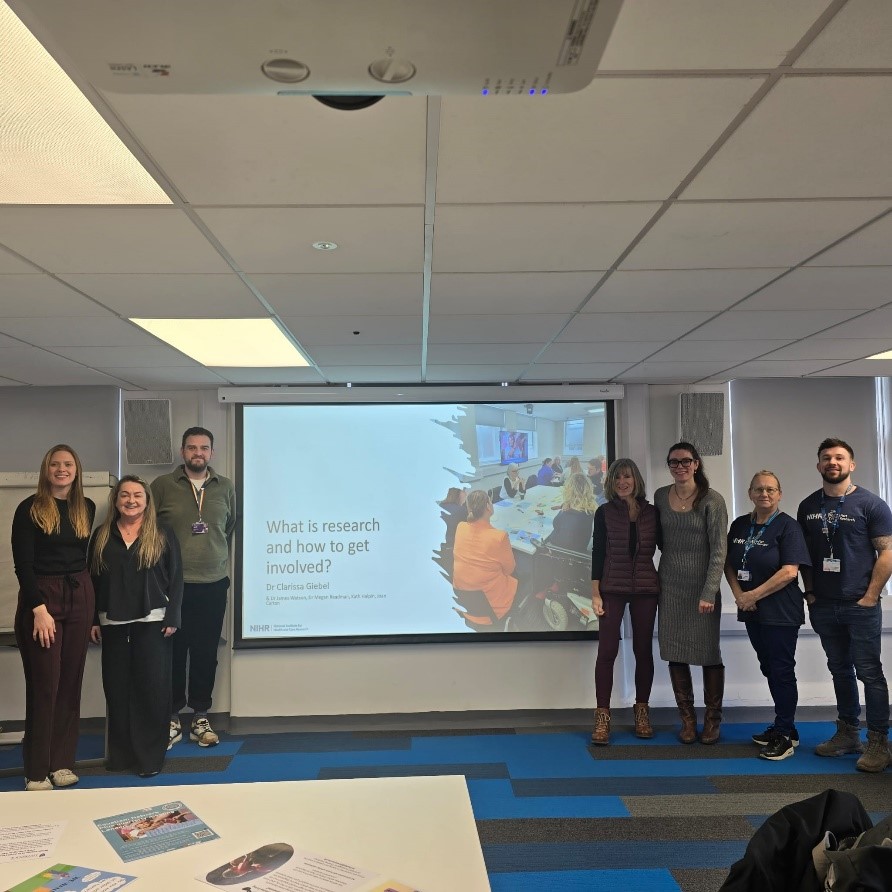Exploring Research Involvement: Insights from the ARC NWC Public Seminar

The latest ARC NWC Public Seminar, “What is research and how to get involved?“, brought together researchers, public contributors, and community members at the University of Liverpool on 5th February. The session aimed to break down barriers to research involvement and highlight the vital role of public engagement in shaping relevant and impactful studies.
Dr Clarissa Giebel opened the seminar by exploring what research is and why it plays a crucial role in shaping improvements in health and social care. She highlighted the importance of making research accessible and inclusive from the outset, ensuring that those affected by its outcomes have a voice in shaping it.
‘Understanding the research process is the first step to involvement,’ she explained. ‘By ensuring a diverse range of voices contribute from the start, we can produce findings that genuinely reflect the needs of our communities.’
ARC NWC DEM-COMM Research Fellow Dr Meagan Readman and ARC NWC Postdoctoral Research Associate, Dr James Coleman Watson followed, sharing examples of their work and illustrating how public involvement can lead to real-world impact.
Dr Readman spoke about her experiences collaborating with public contributors: “Their input has completely reshaped aspects of my research. Lived experience brings a depth of understanding that data alone can’t provide.” Dr Coleman Watson echoed this sentiment, emphasising how research benefits from direct community involvement. “Public contributors challenge us to think differently, ensuring our work remains relevant and practical,” he said.
The seminar also focused on the power of lived experience in research. ARC NWC Public Advisors Kath Halpin and Joan Carton shared their personal journeys of working alongside researchers. “Being part of research has given me a voice and a way to contribute to something bigger,” said Kath. “Our experiences offer a perspective that researchers might not otherwise consider, and that can make all the difference in ensuring research is relevant and meaningful.”
Joan highlighted the need for research to be shaped by the communities it serves. “It’s about making sure research isn’t just something that happens in universities but is directly informed by the people it affects,” she explained. “By working together, we can create research that leads to real change in the wider communities.”
Practical advice on getting involved in research was provided by representatives from the NIHR North West Delivery Network team, who outlined different ways people can engage, from participating in clinical trials to co-producing applied research projects.
‘Getting involved in research can take many forms,’ said Margaret Broughton-Smith, Senior Clinical Research Practitioner at the Research Delivery Network ‘Whether you’re participating in clinical trials that contribute to new treatments or collaborating on applied research projects that have real-world impact, there’s a role for everyone.’
Research Support Facilitator at Research Delivery Network, Ashley Minchin added, “Applied research is about making a difference in people’s lives. We encourage individuals to get involved, as their contributions can directly shape the future of healthcare.”
The event concluded with an open discussion, allowing attendees to ask questions and reflect on how research can become more inclusive.
The event played an important role in bringing people together to learn, share experiences, and explore ways to take part in research, providing a platform for open discussion and helping to bridge the gap between researchers and the public.
By making research more transparent and collaborative, these sessions encourage greater participation and ensure studies are informed by a wide range of perspectives. This seminar is part of ARC NWC’s ongoing commitment to fostering inclusive research and ensuring that public voices remain central to knowledge generation.
For more information on how to get involved in research, click here.